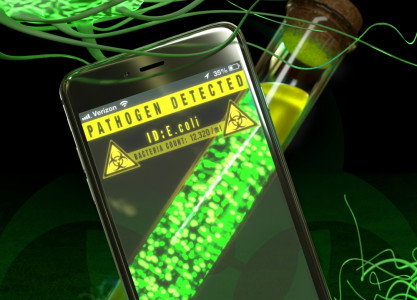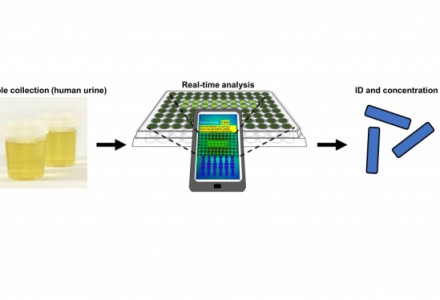
WHY THIS MATTERS IN BRIEF
Figuring out if you’re ill or not is the easy part, but figuring out what disease you have is difficult until now.
 Interested in the Exponential Future? Connect, download a free E-Book, watch a keynote, or browse my blog.
Interested in the Exponential Future? Connect, download a free E-Book, watch a keynote, or browse my blog.
The combination of the cameras, microphones, and sensors in smartphones with Artificial Intelligence (AI) and Machine Vision systems now means that your smartphone and smart devices are quickly turning into rudimentary tricorders that can be used to detect everything from ADHD, dementia, disease, and epilepsy, all the way through to heart disease, pancreatic cancer, and skin cancers. Despite all these advances though in some cases they can’t tell you what disease you have.
Now though American scientists have developed a smartphone app that can identify types of bacteria in one hour, down from a typical turnaround of 18 to 28 hours. The reduced detection time should mean faster diagnosis, treatment and recovery for patients, as well as reduced costs.
The method relies on a smartphone’s camera alongside a diagnostic kit, called smaRT-LAMP, consisting of “little more than … a hot plate, LED lights, low force mini-centrifuge and a cardboard box,” which can be used to analyse a patient’s urine, faeces or blood. Smartphone aside, the kit can apparently be produced for under $100.
The process involves breaking down the patient sample using sodium hydroxide, detergent and heat. The resulting lysate is combined with a so-called LAMP reaction mixture which fluoresces in the case of a positive result. LAMP stands for loop mediated isothermal amplification – an emerging cheap and robust DNA amplification method, which increases the number of copies of target DNA fragments present in the sample.
“We believe that this lab test holds exciting potential to bring state-of-the-art diagnostics within easy reach of non-expert users,” lead researcher, professor Michael Mahan of the University of California, Santa Barbara (UCSB) explains in the press release. The research team hopes that the compact kit can be used to achieve fast diagnosis by non-specialists in remote parts of the world.
Mahan led the project alongside Stanford University professor Tom Soh. They were assisted by physicians Lyn Fitzgibbons and Jeffrey Fried of Santa Barbara Cottage Hospital, as well as other scientists from that hospital and UCSB.
In testing, the app worked well in diagnosing one of the most common kinds of infection, those of the urinary tract. According to the research, the kit can match the performance of traditional methods of clinical diagnosis, and isn’t prone to false positive results.
“Urinary tract infections are particularly harmful to pregnant women and can cause miscarriage,” Fitzgibbons explains in the press release. “Thus, there is a medical need for rapid, low-cost, on-site testing – particularly in resource-limited settings.” The research suggests the technology could be used to monitor pregnant women being treated to prevent acute cystitis, pyelonephritis and miscarriage. Fitzgibbons specialises in the treatment of infectious diseases.
However, the researchers say the system can be used to spot a number of pathogens and therefore diagnose other bacterial infections. They say the app is effective in diagnosing at an early stage, which allows fast treatment that can cut the risk of pathogens such as MRSA emerging, which are resistant to treatment.
The research was funded by the US National Institutes of Health, the Chan-Zuckerberg BioHub and the Bill and Melinda Gates Foundation. The app, named Bacticount, was developed for Android devices and is available for free from the Google Play Store.
Source: UCSB


















